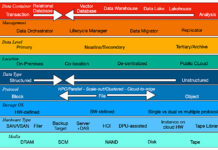Data catalog and intelligence tech supplier Alation has raised $123 million in an E-round despite the generally uncertain environment for tech startups.
Customers want to know what data they have and then analyze it to seek out potential commercial opportunities and efficiencies, said Satyen Sangani, Alation CEO and co-founder

“The modern enterprise needs data in good times … and even more so in bad,” he said. “In one of the most challenging times to raise capital, especially for late-stage SaaS companies, we sourced the capital needed to continue to grow the business. While negative volatility has many pre-IPO companies slashing valuations and halting investments, we defied the odds, raised $123 million, and increased our valuation.”
Alation will use the cash to increase product research and development, build new products, and make acquisitions to expand its multi-tenant SaaS. The money will also be used to expand Alation’s global head count, currently standing at a little more than 700.
The funding, Alation says, follows five consecutive quarters of accelerated growth. The company was founded in 2012 and now has nearly 450 customers, including more than a quarter of the Fortune 100. It has passed the $100 million ARR mark. Total funding to date is $340 million and the business is now valued at $1.7 billion-plus, about 50 percent more than before.
The latest round was round led by Thoma Bravo, Sanabil Investments, and Costanoa Ventures with participation from new investor Databricks Ventures. Other investors include Dell Technologies Capital, Hewlett Packard Enterprise (HPE), Icon Ventures, Queensland Investment Corporation, Riverwood Capital, Salesforce Ventures, Sapphire Ventures, and Union Grove.
Databricks is, of course, a startup as well, founded in 2013. It has raised $3.4 billion, with $2.6 billion coming from two rounds in 2021 alone.
There are more than 100 joint Alation-Databricks customers. Databricks and Alation reckon the two companies will accelerate joint go-to-market initiatives based on product integrations with Databricks’ Delta Lake and Alation’s Unity Catalog. This is intended to deliver data discovery, governance, and end-to-end lineage experiences for data engineering, data science, and analytics use cases on Databricks’ Lakehouse Platform.








